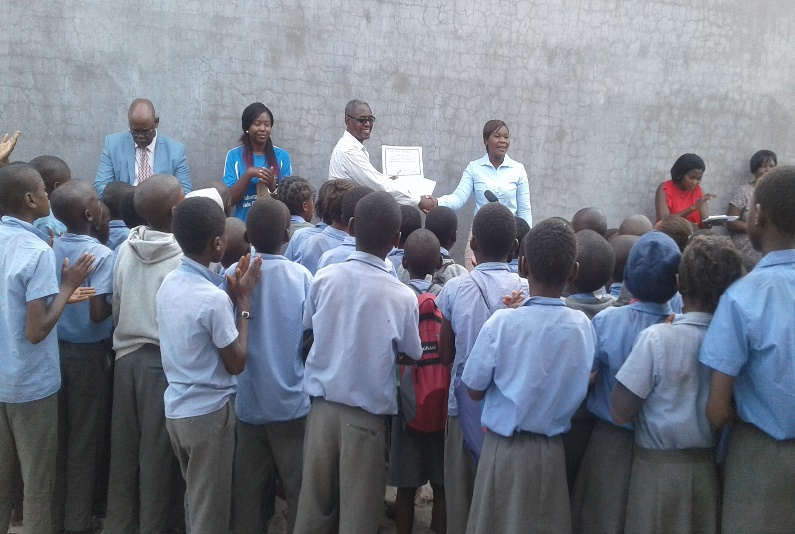
In Namibia, the prevalence of HIV infection among adults aged 15 to 49 is nearly 14%.[1] A key component of national efforts to prevent the spread of HIV is voluntary medical male circumcision, or VMMC, which has proved to reduce the rate of male-to-female transmission by upwards of 60%.
Since 2010, the International Training and Education Center for Health (I-TECH) has supported the VMMC efforts of the Namibian Ministry of Health and Social Services (MOHSS) in the Oshana and Zambezi regions. I-TECH not only supports health care worker training in the provision of VMMC, it is also engaged in critical efforts to create demand for the procedure.
A key element of these efforts is the recognition of schools and school leadership who are supportive of VMMCs. In February, Ashitenga Primary School in Oshana Region was awarded a platinum certificate by I-TECH Namibia for achieving 96% saturation of boys receiving a VMMC. Platinum is the highest honor, with bronze signifying 55-69% saturation, silver awarded for 70-79% saturation, and gold given for 80-89% saturation.
Present at the event was the Oluno Circuit Education Inspector Levi Vries. In his remarks, Mr. Vries encouraged other schools to emulate Ashitenga’s good example. He emphasized the importance of student health to attaining educational goals and urged students to spread the VMMC message to others in their families, villages, and neighborhoods.
As part of the Life Skills curriculum, older boys are instructed on HIV prevention, while the younger boys are taught personal hygiene – messages that are reinforced by I-TECH community mobilizers. Teopolina Mupetami, the Life Skills teacher at Ashitenga, encouraged Life Skills teachers at other schools in the area to support the VMMC program. Ashitenga principal Edward Asser echoed the importance of the school’s recognition; he promised to display the certificate proudly in his office.
Three of the circumcised students were interviewed by the Ministry of Information Communication and Technology, which is charged with spreading the message about “the smart cut” in the government media. The boys responded that “they feel clean and protected from sexual related disease,” said Helena Ferdinand, I-TECH community mobilizer. The students prompted boys at other schools to enroll in the VMMC program and expressed their satisfaction with the service.
“The atmosphere at the handover was joyful and a lot of excitement,” said Ms. Ferdinand. “The principal indicated that they will continue to work hard to get a second platinum certificate.”
[1] UNAIDS; http://www.unaids.org/en/regionscountries/countries/namibia
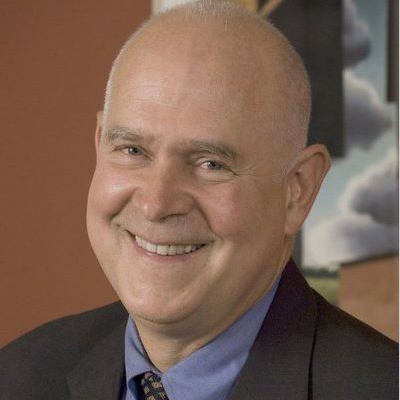
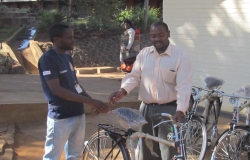
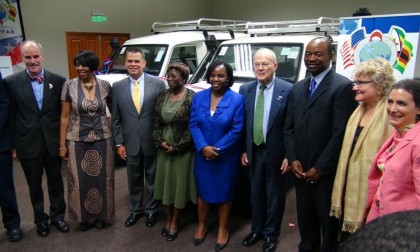
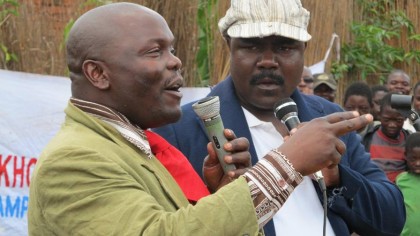 The project has taken a novel approach to recruiting participants by staging a two-week awareness campaign that incorporates comedy, music, and film. The group has engaged the services of popular local comedians Chindime and Samalani and the Health Education Band of the Ministry of Health. VMMC promotional film documentaries will also be shown.
The project has taken a novel approach to recruiting participants by staging a two-week awareness campaign that incorporates comedy, music, and film. The group has engaged the services of popular local comedians Chindime and Samalani and the Health Education Band of the Ministry of Health. VMMC promotional film documentaries will also be shown.